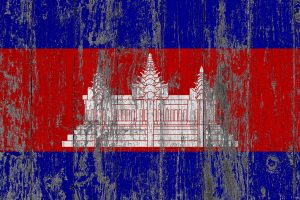Cambodia’s Prime Minister Hun Sen is ramping up the pressure on the country’s beleaguered opposition forces as the country moves to a national election on Sunday, despite the near-total lack of opposition to his ruling Cambodian People’s Party (CPP).
Much of the government’s efforts over the past week have been directed at members of opposition parties who are advocating for voters to submit spoiled or invalid ballots as a form of political protest.
Since July 14, the Cambodian authorities have arrested four members of the opposition Candlelight Party (CLP), which has been barred from taking part in the election on bogus administrative grounds, for advocating an election boycott. On Monday, it also fined 17 exiled opposition politicians for doing the same and banned them from holding elected office for at least 20 years. These included the party’s former president, Sam Rainsy, and six other members of the banned Cambodia National Rescue Party (CNRP), which was outlawed ahead of the 2018 election.
These moves came after the CPP-controlled National Election Committee (NEC) announced that it would take legal action against anyone calling for voters to spoil their ballots. The legal basis for this was provided by amendments to the election law that sailed through the National Assembly on June 23, which made it illegal to advocate boycotting an election or deliberately spoiling a ballot. The changes also barred anyone who boycotts the election from running as a candidate in future elections, a move designed at least in part to ensure the premature retirement of the many CNRP leaders in exile.
It also emerged this week that the government has ordered local ISPs to block a number of independent media websites, which have reported on the intensifying crackdown in trying circumstances. According to the local news site Camboja, which obtained the July 12 order from the Telecommunications Regulator of Cambodia (and thereby presumably placed itself next in the firing line), these included the U.S.-funded broadcaster Radio Free Asia, The Cambodia Daily, whose in-country operations were shut down in 2017, and the newly launched public database Kamnotra, run by the Cambodian Center for Independent Media.
Alongside these efforts, the government has also executed a granular campaign of harassment against CLP officials at the provincial level, as this report from the rights group Human Rights Watch details.
Taking its efforts as a whole – and the political climate has been growing gradually chillier for at least the past year – the CPP has now far exceeded the level of repression necessary to ensure a basic victory on July 23. As the CNRP put it in a statement on Monday, “the run-up to the elections has been characterized by an environment of extreme repression and intimidation.”
But then, this election is about much more than a democratic exercise. It is both the culmination of a political process – the renewal of the CPP’s rule for a further five years in an atmosphere of pomp and acclamation – and the beginning of one: namely, the long-planned generational transition within the CPP, which will see Hun Sen hand over power to his son Hun Manet. Such is the delicacy of this process, and such is its importance to the long-term preservation of Hun Sen’s political legacy and dispensation, that the Cambodian leader sees no measure as too excessive.

































